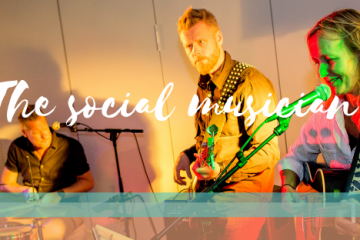
There is a long running joke within my function band. Whenever someone approaches us at the end of a gig, more often than not, they ask what we do for a living.
“So what do you do for a living then?” Or…
“So is this your real job?” Or even better…
“<Insert compliment here> BUT what is your real job?”
It can sometimes feel a bit backhanded. Like music is surely just a hobby and we can’t possibly think of making a living from our music. It can leave you wondering why they would say such a thing.
- Do they think I‘m not good enough to make a solid living from music?
- Do they think music is easy and a lazy choice of living?
- Do they not have respect for the work I put in?
What is a real job?
Leaving their disbelief and disdain behind for a moment, let’s take a look at what actually constitutes a ‘real job’. A quick Google search of “define a real job” produces this description:
Real Job. noun. (idiom)
- A job which requires the employee to, work regular hours for a consistent wage that often exceeds the provisions of applicable minimum wage legislation
- A job that produces a living wage (idiom)
- A job that can’t be replaced advantageously by a machine or a procedure
A ‘real job’ is not the standard description for any term of employment; it’s more of a colloquialism. What people often mean when they refer to a “real job” is simply your main source of work. Something that provides substantial income to support you and your outgoings (and maybe a bit more for savings). For most people this is typically a job in a ‘respectable’ industry with career prospects.
So you can see why this term could feel derogatory when used to dismiss other forms of employment… E.g. self-employment, part-time work or work in a less traditional industry (entertainment, sport, hospitality etc.)
The definition of a ‘real job’ is really subjective… What one person values as a career choice may not be valued at all by someone else. For every person who doesn’t respect music as a career choice there are dozens of other people who do. Many are inspired by what you do, and there’ll be others who are even jealous.
“A job” however, IS easy to define:
- A paid position of regular employment.
- A task or piece of work, especially one that is paid.
(Definition taken from Google, once again)
A simple criteria is that you perform your job role regularly and you get paid for it. If that description fits what you do in music then you most certainly have what could be called “a real job”.
Where do these comments come from?
It may be down to a lack of understanding about what you actually do for a living or an unintended turn of phrase. They probably don’t realise that it sounds as bad as it does. I’ve spoken to people I know who have used this term before and they’ve immediately acknowledged that it was a bad choice of words, what they really mean is “how do you make a living?”. Often this phrasing is used because they don’t know that you CAN make a living from music, short of winning a talent show or contest and being “signed”.
Most people without experience of the music industry only see the final product and the fun you look to be having on stage. A lot of people struggle to grasp that you could possibly make a living from something that you enjoy. Some of this has to do with their own career choice, and partly from a prejudice against certain types of work. Sometimes this begins in childhood, whether that pressure comes from family, friends or role models (teachers, coaches, celebrities etc.), or perhaps newspapers and articles they may have read online.
I know a lot of people who were discouraged from doing what they loved, to be forced towards something that simply “paid the bills”. There are more valuable attributes when considering your career path than simply how much money you can earn and it is worth considering that, always. Although you do need to ensure you have money to live on – more on this covered throughout the site.
What if I don’t fit the definitions above? Should I give up and get a new profession?
Whether you work as a full-time or part-time musician, music is still a rewarding and valued profession that takes years of training and constant practice to master.
The average musician in the UK earns roughly £26,000 per year. This goes up with the more experience you have in the industry and it takes hard work to achieve, and many musicians earn much more. If you have found financial stability in music then you should take pride in the hard work that it took to get there, and the continued hard work to maintain it.
Every musician you have ever seen started somewhere, and had to put in time, effort and dedication to get to where they are today. Even the greats began their music career without being able to earn a living from it… What matters is that you are comfortable with what you are doing in music.
Top tips
Know your story:
- Are you happy that you’re earning enough from music (or that you can)?
- Do you view your music career as “a real job”?
- Or do you prefer to keep your music as just a hobby?
The important thing is that you are happy with how you approach music. No matter how many people tell you that music isn’t “a real job”, this is your life, and however you choose to spend it is up to you. Don’t let anybody steal your self-belief. You hold the key to your own destiny.
Value the work you put in:
Always remember that the work you put in behind closed doors: learning, practicing and writing all counts as work in your profession. That £100 you earned at a gig isn’t just paying for your 1 hour set and PA hire, it’s also paying for your music education, hours spent practicing and the time you’ve taken writing the music and lyrics (the list could go on).
Don’t take offence:
Of course ‘what’s your real job’ could be perceived as a derogatory, backhanded comment. But it’s highly unlikely that this is the case. Anybody starting a genuine conversation with you about your choice of work probably doesn’t want to offend or upset you… They’re just interested to find out more.
Share and educate:
Take time to tell your story and be proud of sharing the hard work involved as a full time musician. Show off your unique ‘real job’.
Over to you… Have you ever been asked what your ‘real job’ is?
We’d love to hear your thoughts and stories, how do you manage this question?
If you’ve enjoyed this article, then please share it using our social media icons below.


